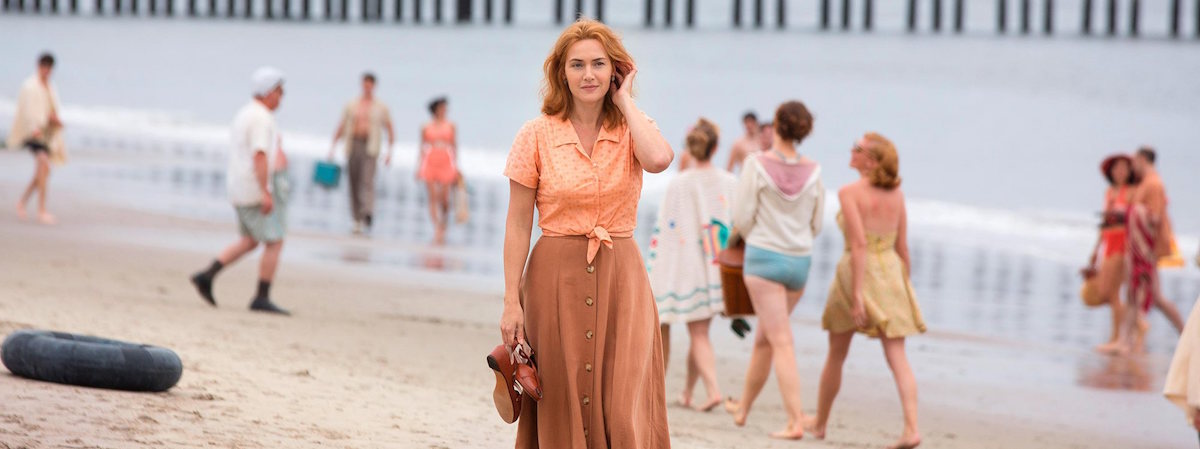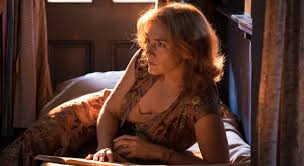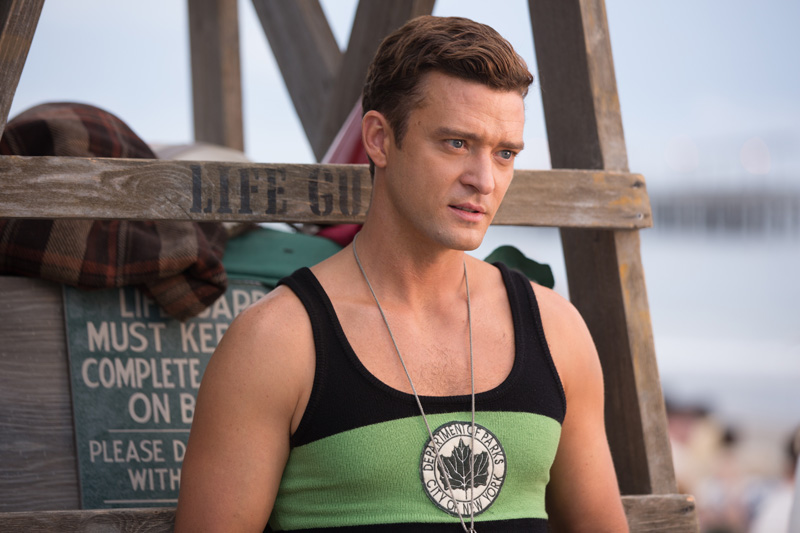The number of films written and directed by Woody Allen is impressive — 48 since 1969, an average of one every year. That prolificity, writes Peter Biskind in the New York Times Book Review, often works against him. “The time when Allen’s every new release was a cause for celebration is long over; now we take him for granted,” Biskind writes, “and the thematic consistencies that are applauded in other auteurs are derided in Allen.” Biskind argues convincingly that Allen is “simply one of the great world-class directors, up there with his hero, Ingmar Bergman, and the rest.”
At the center of the story is Ginny, another of the troubled heroines that are Allen’s specialty. Ginny is the sad 39-year-old wife of Humpty (Jim Belushi), given name Harold, the boorish but sometimes well-meaning operator of the park’s carousel ride. Ginny, who claims she was once “a very promising young actress,” is now relegated to waitressing at the park’s clam house. She’s raising a young son, Richie (Jack Gore), from a previous marriage. Richie has troubles of his own, and he’s taken to lighting fires as a form of rebellion. He even lights a fire in the waiting room of the psychiatrist who’s supposed to help cure him of his pyromania.
There are echoes of Blanche duBois in Ginny, who is played by Kate Winslet, with an American accent that grows more persuasive as the movie progresses. Ginny resents being trapped with Humpty, who’s so like Stanley Kowalski he wears a wife-beater undershirt. Humpty derides his wife as a fantasist who “listens to crap on the radio and thinks it’s real.” (Shades of Allen’s Purple Rose of Cairo.) In her sadder moments, Ginny wraps herself in the finery she once wore onstage and waltzes about in nostalgic reverie. When Richie asks about his real father, she tells the story of how she drove him away forever, a page torn directly from A Streetcar Named Desire. As is Ginny’s“mad scene” in the movie’s denouement. Allen has referenced Tennessee Williams before: Cate Blanchett’s fallen aristocrat in Allen’s excellent Blue Jasmine was another Blanche.
Complications arise when Carolina (Juno Temple), Humpty’s adult daughter from his first marriage, shows up at Humpty and Ginny’s cramped apartment. Carolina is on the run from her ex-husband’s mob associates, who want to kill her for informing on them. Humpty, who hasn’t seen his daughter in years is angry — he disowned Carolina after she married that gangster against his advice — but soon enough, he is doting on his daughter, saving all his money to send her to night school to fulfill her dream of being an English teacher.
Ginny, who loathes the “honkytonk fairyland” of Coney Island, resents Humpty’s attention to Carolina and his neglect of her needs and those of her troubled son. She starts an affair with Mickey, a strapping lifeguard who’s studying to become a playwright. Everyone in this film, except for Humpty, has lofty artistic aspirations but is stuck in the dreary present.
Mickey, who is the film’s narrator, is excited by the attentions of an older woman, and an actress to boot. He whisks Ginny around New York, romancing her at the Staten Island Botanical Garden and trysting with her at his Greenwich Village apartment. But everything changes the moment Mickey sets eyes on Carolina. He loses interest in Ginny and decides to pursue her younger, (supposedly) prettier stepdaughter. Mickey wrestles with the dilemma, somewhat disingenuously, explaining to his philosophy-student friend, “The heart has its own hieroglyphics.” Is Woody Allen trolling us by evoking “The heart wants what it wants,” his infamous defense of his relationship with Soon-Yi, adopted daughter of then-girlfriend Mia Farrow?
The casting is mostly excellent, save Miss Temple, whose slurry modern diction makes her an unconvincing mid-century belle. Timberlake, who specializes in flippant fellows, lacks the magnetic charm that would inspire two women to fight over him, but then, pickings are slim in this island enclave, and Mickey cuts a muscular figure in his swim costume. He’s also smart (or pretentious) enough to read Ernest Jones’ Hamlet and Oedipus.
Allen’s scripts always have a good central idea, but sometimes the ideas are less than fully developed. This film’s central notion is intriguing: bleak melodrama set against the artificial gaiety of Coney Island But Allen’s usually sharp writing falters a bit, and much of the dialogue is hackneyed. There are suggestions of interesting plot developments, as when Ginny, feeling rejected, tosses onto the beach an expensive pocket watch she has bought and had engraved for Mickey. The viewer, perhaps thinking of Guy Haines’ engraved cigarette lighter in Hitchcock’s Strangers on a Train, anticipates that someone will find the compromising item, revealing the affair. But this is not a movie that satisfies those traditional expectations.
Acknowledging the difficulty of developing ideas, Allen told his frequent biographer, Eric Lax, that he has piles of papers with script ideas written on them, all awaiting the flash of inspiration. “It’s the then what that kills you.”
Even his less successful, minor-key films, however, have interesting qualities. Wonder Wheel is distinguished by its fantastic setting and its affecting portrait of a woman unraveling. And as always with this filmmaker, it wrestles with a moral question: how culpable is a person who fails to act to prevent harm?
 |
| Kate Winslet as the troubled Ginny. |
The volume of Allen’s output also means that some of the films will be less than great, like his latest, Wonder Wheel. But even the least successful of the films will have something thematically and stylistically memorable. Wonder Wheel, a nostalgia piece set on Coney Island at a time described broadly as “the 1950s,” the vintage theme-park setting is the star. Allen has always had good taste in cinematographers: Vittorio Storarro renders the tacky loveliness of the amusement park roller coasters, Ferris wheel, diners and signs in gloriously artificial carbro-print type colors. The story, a rather thin melodrama, doesn’t make as much use of its setting as it might, but what a wonderful setting it is!
At the center of the story is Ginny, another of the troubled heroines that are Allen’s specialty. Ginny is the sad 39-year-old wife of Humpty (Jim Belushi), given name Harold, the boorish but sometimes well-meaning operator of the park’s carousel ride. Ginny, who claims she was once “a very promising young actress,” is now relegated to waitressing at the park’s clam house. She’s raising a young son, Richie (Jack Gore), from a previous marriage. Richie has troubles of his own, and he’s taken to lighting fires as a form of rebellion. He even lights a fire in the waiting room of the psychiatrist who’s supposed to help cure him of his pyromania.
 |
| Gotta get out of this place. |
Complications arise when Carolina (Juno Temple), Humpty’s adult daughter from his first marriage, shows up at Humpty and Ginny’s cramped apartment. Carolina is on the run from her ex-husband’s mob associates, who want to kill her for informing on them. Humpty, who hasn’t seen his daughter in years is angry — he disowned Carolina after she married that gangster against his advice — but soon enough, he is doting on his daughter, saving all his money to send her to night school to fulfill her dream of being an English teacher.
Ginny, who loathes the “honkytonk fairyland” of Coney Island, resents Humpty’s attention to Carolina and his neglect of her needs and those of her troubled son. She starts an affair with Mickey, a strapping lifeguard who’s studying to become a playwright. Everyone in this film, except for Humpty, has lofty artistic aspirations but is stuck in the dreary present.
Mickey, who is the film’s narrator, is excited by the attentions of an older woman, and an actress to boot. He whisks Ginny around New York, romancing her at the Staten Island Botanical Garden and trysting with her at his Greenwich Village apartment. But everything changes the moment Mickey sets eyes on Carolina. He loses interest in Ginny and decides to pursue her younger, (supposedly) prettier stepdaughter. Mickey wrestles with the dilemma, somewhat disingenuously, explaining to his philosophy-student friend, “The heart has its own hieroglyphics.” Is Woody Allen trolling us by evoking “The heart wants what it wants,” his infamous defense of his relationship with Soon-Yi, adopted daughter of then-girlfriend Mia Farrow?
 |
| Timberlake as the literary lifeguard and heartthrob. |
Ginny, consumed with jealousy, tries to sabotage Mickey and Ginny’s romance without exposing her own infidelity. Soon afterward two gangsters, played by The Sopranos‘ Paulie and Bobby (Tony Sirico and Steve Schirripa), show up looking for Carolina. It falls to Ginny to decide whether to intervene.
The casting is mostly excellent, save Miss Temple, whose slurry modern diction makes her an unconvincing mid-century belle. Timberlake, who specializes in flippant fellows, lacks the magnetic charm that would inspire two women to fight over him, but then, pickings are slim in this island enclave, and Mickey cuts a muscular figure in his swim costume. He’s also smart (or pretentious) enough to read Ernest Jones’ Hamlet and Oedipus.
Allen’s scripts always have a good central idea, but sometimes the ideas are less than fully developed. This film’s central notion is intriguing: bleak melodrama set against the artificial gaiety of Coney Island But Allen’s usually sharp writing falters a bit, and much of the dialogue is hackneyed. There are suggestions of interesting plot developments, as when Ginny, feeling rejected, tosses onto the beach an expensive pocket watch she has bought and had engraved for Mickey. The viewer, perhaps thinking of Guy Haines’ engraved cigarette lighter in Hitchcock’s Strangers on a Train, anticipates that someone will find the compromising item, revealing the affair. But this is not a movie that satisfies those traditional expectations.
Acknowledging the difficulty of developing ideas, Allen told his frequent biographer, Eric Lax, that he has piles of papers with script ideas written on them, all awaiting the flash of inspiration. “It’s the then what that kills you.”
Even his less successful, minor-key films, however, have interesting qualities. Wonder Wheel is distinguished by its fantastic setting and its affecting portrait of a woman unraveling. And as always with this filmmaker, it wrestles with a moral question: how culpable is a person who fails to act to prevent harm?

No comments:
Post a Comment
We approve all legitimate comments. However, comments that include links to irrelevant commercial websites and/or websites dealing with illegal or inappropriate content will be marked as spam.
Note: Only a member of this blog may post a comment.